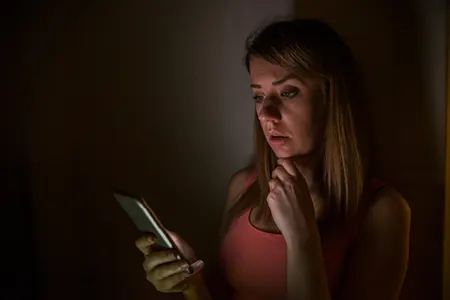What You Need to Know About Sexual Violence Online or on Electronic and Digital Devices

Sexual Violence Online. Unsolicited and non-consensual sexual interactions may occur through technology, such as photos, videos, social media platforms, or dating apps. This kind of behavior can leave someone feeling manipulated and unsafe online–not to mention worried about their reputation. It’s important to be informed on the laws that apply in different states and platforms regarding these situations; they are everchanging. Get more knowledge so you can come prepared with ways to report it if needed and protect yourself against further invasion of your privacy.
What are some ways people use digital technology to hurt others?
The following list includes some of the ways a person can use digital technology in a sexually explicit or violating way:
- Unsolicited or unwanted sharing of pornography or pornographic images
- Distributing or threatening to distribute sexual or intimate images of someone without their consent, also known as digital sexual assault or revenge porn
- Hacking into someone’s online accounts or devices to steal personal images or information not intended for public sharing
- Catfishing – faking one’s identity online to begin a sexual relationship
- Cyberbullying
- Cyberstalking
- Gaming Harassing – harassing someone through a gaming platform
- Posting shaming, embarrassing, sensitive, or otherwise inappropriate information about someone on social media or other public sites, whether it is true or not
- Sexting, repeated asking for explicit images
- Sending sexually explicit emails, chats, texts, photos, videos, or emojis that are unwelcome or unsolicited
- Taking sexually explicit pictures or videos of someone without consent
Effects of Sexual Violence Online or on Digital Devices
Experiencing sexual harassment, abuse, or bullying online can cause a plethora of negative feelings. The following list is not meant to be exhaustive but provides an overview of some possible consequences you may encounter after enduring this experience:
- Feeling violated, ashamed, humiliated
- People report feeling depressed
- Feeling Anxious
- Having Panic Attacks
- Lack of Motivation
- Having difficulty concentrating
- Abusing Substances
How can I report online sexual violence and unwanted contact on digital devices?
If you find yourself in an uncomfortable or inappropriate situation, you can take action. Even if there are no legal mandates against such behavior, it is possible to remove and block those involved from a website.
If you are the recipient of menacing communication, part of a pattern of abuse, or consistent with harassment, don’t hesitate to contact the police and seek legal counsel. Even if you do not file criminal charges, you may be able to file a civil suit against the person or get an order of protection from such contacts over social media along with other digital platforms.
- Record all pertinent information by promptly taking screenshots or printing out texts, social media posts, and other interactions. To ensure the accuracy and accountability of the individual who is being harmful, your screenshot should include their info as well as a timestamp.
- If the altercation occurred on a public website or social media channel, you can easily report it to the host of that platform. Most websites where users can interact have an option for reporting unwanted or inappropriate behavior to the platform by clicking a report button or finding the reporting request function on the platform or website.
- If the person harassing or abusing you is local, contact your authorities and make a report. Should they be at your school, feel free to file an anonymous complaint as well. If you’re experiencing harassment through digital platforms such as social media sites or online gaming apps, you can also directly report it on their respective websites; however, do note that laws governing this realm may not exist in certain areas yet.
- In cases involving minors or pictures of minors, it is important to contact the police right away. If you are a minor with photos of yourself that have been sent and/or possessed, contacting an adult for help would be beneficial.
- If someone is making you feel uncomfortable, and they are a student, teacher, or administrator at your college, university, or K-12 school; it might be worth talking to the Title IX officer or a person in authority that you trust. Educational institutions have specific policies they must adhere to if you report what is happening to the Title IX Office, an administrator, or a teacher.
What can I do to protect myself and my family online while using digital devices?
To ensure your safety and security on various platforms, you can take some preventative measures.
- Protect yourself and your data by regularly setting up a passcode on all devices.
- Log out from any social media or messaging accounts when you have finished using them.
- Avoid having passwords saved in web browsers or other applications as this can lead to security breaches
- Never let anyone force you to give out confidential information. If someone on the internet is trying to pressure you into disclosing personal details, such as your full name, address, date of birth, or phone number– don’t hesitate to block their messages.
- Guard yourself against dangerous messages from unfamiliar sources. Whether it be a text, call, friend request or private message – if you don’t recognize the sender, simply disregard, and delete them without reading them. Not only could they contain inappropriate material that you’d rather not see but they could have viruses too.
- If someone’s behavior makes you feel uneasy on a public website, be proactive and use the site’s reporting function to block or report them promptly. This is an important step that can help protect yourself from potential harm.
- Protect your privacy – always cover up your webcams, laptop cameras, and phone cameras when not in use. Otherwise, malicious people may access them to capture images or videos of you without your knowledge – a simple sticker or tape is all it takes to keep someone from getting images of you with your own web cam.
Help is Available
Remember, you are not alone. If you or anyone you know has been a victim of sexual violence and would like guidance and/or support, please call or text our 24/7 HOTLINE at: 215-985-3333 – all calls are confidential, and you can remain anonymous.
More information can be found here: What is Sexual Violence? and Sexual Violence Among Adults.





